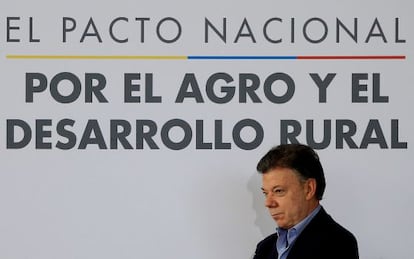Santos launches the “agrarian pact” in response to the general strike
The Colombian leader signed various decrees to boost agriculture and announced that he would offer its products on the Venezuelan market

Three weeks of protests by Colombian peasants lead to numerous road blockades that lasted until last Tuesday. They triggered an exponential drop in President Juan Manuel Santos’ popularity and sent shock waves through his cabinet. Now, the government is launching “The Great Agrarian Pact,” a concerted effort to get past the strike and reorganize the Colombian peasantry, a sector that has been ignored for decades. More than 46.8% of peasants dwell and they have born the brunt of the armed conflicts.
"These rural demonstrations force us to reengineer our way of thinking about development [in the agricultural sector]," Santos said during the inauguration of four of his nine ministers. And this re-engineering feat has to do with, among other things, the formation of the Pact where the government, the agricultural sector, the peasants, indigenous tribes, afrocolombians, parliamentarians, mayors, governors, and scholars will work together. Santos hopes that from this collaboration will lead to "a truly agricultural, modern and fair policy that looks toward the future."
However, not all peasant leaders who participated in the general strike showed up for the first meeting and others who attended, such as Héctor Centeno, spokesperson for the peasants of Boyacá y Cundinamarca, did not accept Santos' proposal and left the conference. The movement, Dignidad Agropecuaria Nacional or National Farming and Fishing Dignity, a umbrella group of small coffee and rice growers, dairy farmers, among others, announced in a press release that they would abstain due to the "official resistance to modifications in the free trade agreements and the proposals of the Society of Colombian Farmers championing industry farming as the pillar of the agrarian policies."
Santos, who was at the opening and closing ceremonies of the meeting - insisted that the Pact is inclusive and in harmony with the agreements signed with the FARC in Havana on agrarian issues. "What the first point agreed upon in Havana shows is that we all see the need - or better yet, the urgency - to focus public policy toward the greater good of the people in the countryside and to create the conditions that will make it possible to compete in the global market," he said.
At the end of the day, Santos announced that he had signed a number of decrees to implement some of the measures he had promised to the strikers. The first is that he will remove the tariff on agricultural supplies, establish a price control mechanism for those items and a commission to oversee its regulation. One of the most pressing concerns of the peasants was the high cost of fertilizers and supplies.
Santos also said he would strengthen the structure of the Ministry of Agriculture with the creation of a Vice Ministry for Rural Development. He made a commitment to eliminate the import quota on buttermilk and whey. The president said that, from now on, he will formalize the System for Popular Engagement "so that the National Pact will include the Agro one and so that we can implement it successfully," he explained.
The most important news was the agreement to reopen bilateral trade with Venezuela. The neighbor country will buy 600 million dollars worth of agricultural goods from Colombia "which means a 20% increase in exports to Venezuela," Santos said. "And we will make sure that the payment system gives the necessary assurances to producers," he continued, recognizing that Venezuela "needs our products and we need to sell them."
The list includes 40,000 tons of ultra-pasteurized powder milk, 6,000 tons of butter and margarine, 32,000 cattle, 42,000 tons of meat, 20,000 tons of palm oil, 32,000 boxes of fertile eggs, and almost 1.7 million newly hatched chickens.
This last week Santos and his ministers have reached agreements with all the groups that participated in the strike and got them to clear off the roads. The peasants demand for subsidies for small producers, restrictions on imports and contraband goods, access to credit, debt management, price control of raw materials, fertilizers and transport -as shock absorbers due to the impact of free trade agreements.
The government signed an accord with the indigenous tribes of Pastos and Quillacingas in the south to buy 40,000 liters of milk every day from them for the next 15 months. It has also banned the rehydration of imported powder milk.
On their end, farmers in the provinces of Boyacá, Cundinamarca and Nariño were able to push for a restriction, a safeguard against the importation of fresh, pre-cooked and frozen potatoes, onion, beans, peas, pear, powder milk, and fresh cheeses from Mercosur and Pacific Alliance countries. They also asked to throw out a measure that punishes those who use non-certified seeds.
In the southern provinces the Vice President Angelino Garzón, in principle, reached an agreement with the last group of demonstrators who were blocking various roadways. Garzón promised to bring together a commission to negotiate the demands of the strikers on issues such as access to land, replacement of illicit crops and the commitment to allow them to take part in the conversation when making new agrarian policies.
Now peasants are waiting to see wether the government implements the agreements. Today, even as Santas was introducing the Agrarian Pact, members of the Mesa Nacional Agropecuaria y Popular de Interlocución y Acuerdo (National and Popular Farming Roundtable for Discussion and Accords) held the Popular Agrarian Summit in Bogota, where they confirmed that the strike will continue in some areas.
Translation: Dyane Jean François







































